|
|
Since I’m not particularly inclined to writing reviews right now, I thought it might be fun if I talked a little bit about the myriad of books I’m reading at the moment and how they’re going. I’m not reviewing a very big portion of my books right now, so this might be a fun way to let you all know and comment on some of the rest of those reads a bit, if you’d like.
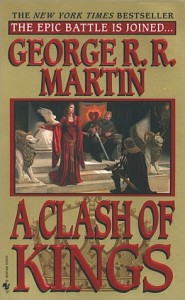 So! First up, I’ve been re-reading A Song of Ice and Fire by George R. R. Martin. I re-read A Game of Thrones and found myself completely swept up in it, despite the fact that I’ve read it twice and seen the show. I’m now in the middle of A Clash of Kings and I actually love this one, too. It’s so nice to get swept back up in a world that feels familiar, and I’ve been having a strange sort of fun picking out the differences between the show and the book. There are parts of the show that I’m convinced didn’t happen, so I’m looking forward to finding out whether this is true or not. So! First up, I’ve been re-reading A Song of Ice and Fire by George R. R. Martin. I re-read A Game of Thrones and found myself completely swept up in it, despite the fact that I’ve read it twice and seen the show. I’m now in the middle of A Clash of Kings and I actually love this one, too. It’s so nice to get swept back up in a world that feels familiar, and I’ve been having a strange sort of fun picking out the differences between the show and the book. There are parts of the show that I’m convinced didn’t happen, so I’m looking forward to finding out whether this is true or not.
The whole reason I am re-reading the books is that I can’t remember what happens in A Storm of Swords, which is the current book / TV show, and it is irritating me. In addition, I haven’t actually read A Dance with Dragons, which is the fifth book (although I have it in two volumes, it is one book), so re-reading these means I will finally get to it.
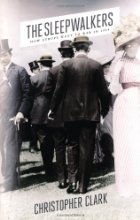 The other book that I’ve been reading for what feels like a short eternity is The Sleepwalkers by Christopher Clark. It attempts to re-evaluate the causes of World War I, and since my husband has been interested in World War II and *its* origins, I’ve been trying this out for him as a background to the background, if that makes sense. I like history, he wants to make sure he’s reading something that will explain things to him properly, so it works out. Unfortunately this feels dense even for me, who loves history. I think it’s just because I don’t recognize any of the names or places in eastern Europe, so I quickly lose track of the significant Serbians simply because my brain doesn’t want to process their names. It’s annoying, and I’m actually very interested in the subject matter, so I’m persevering. The other book that I’ve been reading for what feels like a short eternity is The Sleepwalkers by Christopher Clark. It attempts to re-evaluate the causes of World War I, and since my husband has been interested in World War II and *its* origins, I’ve been trying this out for him as a background to the background, if that makes sense. I like history, he wants to make sure he’s reading something that will explain things to him properly, so it works out. Unfortunately this feels dense even for me, who loves history. I think it’s just because I don’t recognize any of the names or places in eastern Europe, so I quickly lose track of the significant Serbians simply because my brain doesn’t want to process their names. It’s annoying, and I’m actually very interested in the subject matter, so I’m persevering.
Finally, the last book that I’ve just started is The Doctor and the Diva by Adrienne McDonnell. I’m only about 20 pages in, so I don’t have any real thoughts on it yet, but I’ve put it off for 3 years, so I’m clearly not madly excited to read it. I’m still hopeful that it will be worth the time I intend to spend reading, though.
What are you currently reading?
 Well, I didn’t do very well with posting on my blog during this particular Read-a-thon, did I? I saw quite a few people posting on Tumblr and then linking their updates back to a main post, and I think I might just do that next time. I checked in on Twitter every so often and I’m looking forward to going around and seeing how everyone did a bit later on this afternoon. Well, I didn’t do very well with posting on my blog during this particular Read-a-thon, did I? I saw quite a few people posting on Tumblr and then linking their updates back to a main post, and I think I might just do that next time. I checked in on Twitter every so often and I’m looking forward to going around and seeing how everyone did a bit later on this afternoon.
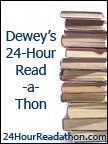 My time zone in the UK makes the Read-a-thon’s hours a little bit awkward; it officially runs from 1 pm on Saturday to 1 pm on Sunday. There is simply no way that I can stay up all night and then until 1 pm, much less go to work on Monday, so I’ve never actually tried, but I like that I still get to spend Sunday morning reading away and generally getting one last book in before the event is over. It’s even easier now that my schedule seems to ensure I’m up around 7 or 7:30 on the weekend, so I had hours to read Midnight Blue-Light Special by Seanan McGuire and try to make some progress in The Sleepwalkers by Christopher Clark. My time zone in the UK makes the Read-a-thon’s hours a little bit awkward; it officially runs from 1 pm on Saturday to 1 pm on Sunday. There is simply no way that I can stay up all night and then until 1 pm, much less go to work on Monday, so I’ve never actually tried, but I like that I still get to spend Sunday morning reading away and generally getting one last book in before the event is over. It’s even easier now that my schedule seems to ensure I’m up around 7 or 7:30 on the weekend, so I had hours to read Midnight Blue-Light Special by Seanan McGuire and try to make some progress in The Sleepwalkers by Christopher Clark.
That makes now perfect to answer the questions around the End of Event meme:
1. Which hour was most daunting for you?
I suppose the hour in which I fell asleep, which was around my 11 pm. I have no stamina these days, especially not after waking up early and taking a driving theory test, so it’s something of a surprise that I didn’t fall asleep at 9!
2. Could you list a few high-interest books that you think could keep a Reader engaged for next year?
My choices were all good until the last book – I always go for short books that I know I can read quickly. This time fantasy was all I managed to read.
3. Do you have any suggestions for how to improve the Read-a-thon next year?
Nope!
4. What do you think worked really well in this year’s Read-a-thon?
I’m not sure I spent enough time on the website or doing any of the challenges to notice – I liked how visible the hosts were on Twitter, though, when I did pop in to check.
5. How many books did you read?
Two full books and parts of two more.
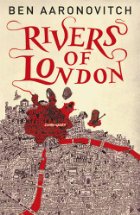 6. What were the names of the books you read? 6. What were the names of the books you read?
Rivers of London by Ben Aaronovitch, Charmed Life by Diana Wynne Jones, Midnight Blue-Light Special by Seanan McGuire, and The Sleepwalkers by Christopher Clark.
- 7. Which book did you enjoy most?
Probably Midnight Blue-Light Special although I also really liked the first two. No stand-out loves.
- 8. Which did you enjoy least?
I’m really struggling with The Sleepwalkers. It’s all about the origins of World War I and I’m finding it incredibly difficult to keep up with the parts about eastern Europe. I simply don’t know the region or any of the history which makes it slow going for me.
9. How likely are you to participate in the Read-a-thon again? What role would you be likely to take next time?
I hope to still be reading!
Now I’m off to write some reviews, hopefully, so that this blog doesn’t stay silent this week, and check out some posts.
Did you read or cheer this time around? How did you do?
 Good afternoon everyone! I missed last fall’s read-a-thon and I’ve been looking forward to this one ever since. I’m not particularly good at the community aspect of this event usually; I like to pop in on twitter every now and again and visit some other blogs, but mostly I like to read rather than do too many mini challenges. And reading is exactly what I have planned for the rest of the day after a brief diversion taking my UK driving theory test (I passed, thankfully). Good afternoon everyone! I missed last fall’s read-a-thon and I’ve been looking forward to this one ever since. I’m not particularly good at the community aspect of this event usually; I like to pop in on twitter every now and again and visit some other blogs, but mostly I like to read rather than do too many mini challenges. And reading is exactly what I have planned for the rest of the day after a brief diversion taking my UK driving theory test (I passed, thankfully).
So what do I have to choose from today?

Lots I’ve been looking forward to in this pile! But first I’m going to finish Rivers of London by Ben Aaronovitch. I’m only on page 90 but I’m really enjoying it and finishing a book is a great way to start many hours of reading.
Are you reading today? What do you have on your pile?
 George is living out the fairly boring life of a middle-aged divorced “good guy” until one night he hears a strange noise outside his house. He finds a crane, her wing pierced by an arrow; he saves her and she flies away. The next day, a beautiful, somehow old fashioned woman called Kumiko appears outside his print shop, and he falls in love with her almost immediately. George’s adult daughter, Amanda, is mystified and somewhat jealous, living out her own life as a single mother with a small child and feeling as though she’s never quite fit in. In small, significant ways, Kumiko starts to change their lives, but never quite lets them into her own. George is living out the fairly boring life of a middle-aged divorced “good guy” until one night he hears a strange noise outside his house. He finds a crane, her wing pierced by an arrow; he saves her and she flies away. The next day, a beautiful, somehow old fashioned woman called Kumiko appears outside his print shop, and he falls in love with her almost immediately. George’s adult daughter, Amanda, is mystified and somewhat jealous, living out her own life as a single mother with a small child and feeling as though she’s never quite fit in. In small, significant ways, Kumiko starts to change their lives, but never quite lets them into her own.
A re-telling of a Japanese folk tale, The Crane Wife felt to me like an odd mix of beauty and disappointment. In parts of the book, like the actual stories of the tiles, I felt that I could feel the gorgeous writing and meaning I’d found in Patrick Ness’s other works shine through. In most of the book, though, I felt disappointment, as something I’d expected to love fell apart with every page.
Perhaps this book just fell prey to the fact that I really don’t much like stories set in the “real world”. I may be the only person who just didn’t appreciate the fact that George is relieving himself in the middle of the night when he hears the crane on the very first pages of the book. I can, in a way, see how Ness was trying to juxtapose the ordinary with the fantastic, by bringing George right into our world with one of humanity’s most basic needs alongside the crane’s mysterious call and appeal. I can see that, but it’s something that I wasn’t looking for, and so the book hit a wrong note with me immediately.
Plus, the book is insistent on the fact that George is a good, nice guy. He’s one of these nice guys who seems to vaguely feel like the world owes him something for being nice; he has infinite female friends but he’s just too nice for any of them to love him, and his ex-wife actually says this in the course of the book. I don’t like this stereotype; the world doesn’t owe anyone anything and I actually think that there are plenty of women who would love a nice guy (I married one, after all). I also felt that, as the book went on, he actually proved more or less that he wasn’t really that nice a guy.
Much of the book also felt a little bit like it was trying too hard to say something meaningful. Patrick Ness’s other books are incredible and subtle; A Monster Calls affected me so much that I never actually managed to write anything about it because if anything I felt too much. With this book, I honestly just felt distanced from the characters and the story, almost as though I could see how the weaving was meant to affect me without it actually happening.
That’s not to say it’s all bad; I found some beautiful passages within the book, and I almost felt as though the interludes about the woman and the volcano could have worked as a short story on their own. Here’s one that I marked:
Her hand is raised, ready to fall, ready to end this torment, which she will admit, if only to herself, is as bad for her as it has ever been for him. She loves him and it is impossible. She hates him and that is impossible, too. She cannot be with him. She cannot be without him. And both are burningly, simultaneously true in a way that grinds the cliché into dust. (210)
I actually appreciated the message that we need to trust, to believe that those we love will love us back. But I think some of the meaning of the book slipped through the cracks for me.
I wanted to love this book, but it just didn’t happen, and in the end, I feel more disappointed by that than anything else.
I received this book for free for review.
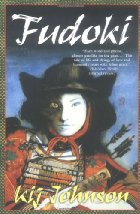 Princess Harueme has lived her life in the shadow of Japanese emperors. In the winter of her years, though, she needs to leave court and head to a convent, where she already knows she will die. Compelled to fill empty notebooks, Harueme begins telling the story of Kagaya-hime, a cat who has lost her family and her fudoki due to a horrible fire in the middle of her city. As the story progresses, Harueme intertwines the tale of her own life with Kagaya-hime’s, and we slowly learn about these two women and their individual struggles. Princess Harueme has lived her life in the shadow of Japanese emperors. In the winter of her years, though, she needs to leave court and head to a convent, where she already knows she will die. Compelled to fill empty notebooks, Harueme begins telling the story of Kagaya-hime, a cat who has lost her family and her fudoki due to a horrible fire in the middle of her city. As the story progresses, Harueme intertwines the tale of her own life with Kagaya-hime’s, and we slowly learn about these two women and their individual struggles.
I never doubt Ana when she recommends a book and this is one I can specifically trace back to her recommendation. I could not resist the idea of this cat-turned-woman story. Even so, as with so many books, it sat on my wishlist until a friend bought it for me, and then I finally read it – and, of course, I loved it. It immediately drew me in with the tale of a tortoiseshell cat who loses her entire family and just barely survives the fire; it’s sad, but poignantly written, and it felt just pitch-perfect. The book remains just that perfectly and magnificently written.
This story of intertwined women shines so brightly and has so many things to say about life that I’m not even sure I can review it properly. It’s one of those books that illuminates things that I hadn’t necessarily thought about, but in a way that stuck me as perfect.
Perhaps some quotes can illustrate this better than I can:
What man, what lost love or deceased kinsman is worth death? The space in my life that my half-brother once filled is now an aching icy pain, like the hole left after a tooth is pulled, and I am dying in weeks or months – and yet I still fight for life, as every mouse does, until the final beak-blow. The grace in tragedy is not to succumb, but to fight on. (87-88)
It’s such a beautiful book. I loved the format with the story of the two women, I loved Kagaya-hime’s cat-like sensibilities, I loved Harueme’s thoughtful reflections on her life gone by. It’s a book to make me wish I was more articulate so I could explain better just why it appealed to me. I haven’t read The Fox Woman which is Johnson’s first book, but I wish that I had, as I’ve read that the books are connected in small ways. In a way, though, I’m glad, because it’s an excuse to read this book again.
Another quote:
Domei once told me that he missed war.
“How can you?” I asked, shocked.
He was drunk and more candid than usual: he slurred as he spoke. ” I have never had such good friends.”
“You are surrounded by people who love you,” I said, “and no one is dying here.” How could war be better than this? Than me?
“We are all dying,” he said. “We just forget that when nothing is trying to kill us.” (233)
Very highly recommended.
 Seraphina has spent much of her life refusing friendships and hiding herself from those who might get close to her. Why? Because she is half dragon, would be considered an abomination by almost everyone she knows, and cherishes her relative freedom from prejudice and prosecution. The love between her parents was forbidden and she has already overstepped her bounds slightly by taking a job in the royal court, helping with the orchestra and giving the Princess Grisselda music lessons. The peace between dragons and humans is an uneasy one, however, particularly when dragons can take human form, indistinguishable from real humans if they fail to wear their bells. Both dragons and humans are wary, and it would take just one powerful rebel to tip the balance. Seraphina has spent much of her life refusing friendships and hiding herself from those who might get close to her. Why? Because she is half dragon, would be considered an abomination by almost everyone she knows, and cherishes her relative freedom from prejudice and prosecution. The love between her parents was forbidden and she has already overstepped her bounds slightly by taking a job in the royal court, helping with the orchestra and giving the Princess Grisselda music lessons. The peace between dragons and humans is an uneasy one, however, particularly when dragons can take human form, indistinguishable from real humans if they fail to wear their bells. Both dragons and humans are wary, and it would take just one powerful rebel to tip the balance.
Seraphina is a book that completely surprised me. I don’t know why – I bought it because I’d seen many praising reviews of it around the blogosphere, so I knew, objectively, that I might like it. But subjectively, it didn’t actually appeal to me that much. I didn’t feel like reading a book about dragons, the cover didn’t broadcast to me that I would like it (although why I’m not sure – on a closer look it’s actually lovely), and YA is not my favorite genre. I bought it when it was on the Kindle Daily Deal, as something that I knew I should try, but had no particular plan to read it. And then I was on the train on Friday, I’d finished the last book I was reading (Widow’s Web by Jennifer Estep), which had ended on a slightly low note, and I just had no idea which book I wanted to read next. For whatever reason, Seraphina called to me then, so I opened it.
It wasn’t even love at first few pages. In fact, I found it difficult to get into, and if I wasn’t sitting on train with nothing else appealing to me much, I might have wandered over to my bookshelves and chosen something else. But I stuck with it, because I had twenty minutes to fill. And then I fell in love with it, and found myself absolutely glued to the Kindle until I finished. I loved it even more because it blind-sided me and I expected not to like it; instead I found an absolute gem. The book has a fantastic, multi-layered world, deep characters, and a plot that races along and managed to surprise me at the end.
I simply adored Seraphina. I loved that the book took prejudice head-on and showed that this tough, brave, sensitive, clever, gifted girl is someone that most of the population around her would hate if they knew her true nature. They adore her, but how easily that could change, and how worried she is despite that affection – this is a worry that is justified but this book is a perfect example of how well fantasy can teach us about our world, too. I even loved how Lucian Kiggs, another significant character in the book, shares some stigma with Seraphina because he’s a bastard, but in a totally different way. We could also talk about how much I loved the romance and how utterly perfect it was, but that really just capped off a book that was already spectacular.
This is the book I wish I’d read instead of all of those disappointing YA fantasy books I did read. Highly, highly recommended.
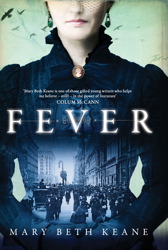 Mary Mallon is an Irish immigrant simply doing her best to get by in a difficult world. At the turn of the twentieth century, few jobs are open to older women, but Mary has found her calling as a cook. By the time she hits her fifth decade, Mary has cooked for some of Manhattan’s most prominent families. But sickness follows her everywhere she goes, though she barely realizes it; after cooking for a few weeks, the family is inevitably hit by an illness that kills one or more of them. Mary never puts together the pieces, but others do, and soon she’s accused of spreading typhoid around New York and killing two dozen people. Mary Mallon is an Irish immigrant simply doing her best to get by in a difficult world. At the turn of the twentieth century, few jobs are open to older women, but Mary has found her calling as a cook. By the time she hits her fifth decade, Mary has cooked for some of Manhattan’s most prominent families. But sickness follows her everywhere she goes, though she barely realizes it; after cooking for a few weeks, the family is inevitably hit by an illness that kills one or more of them. Mary never puts together the pieces, but others do, and soon she’s accused of spreading typhoid around New York and killing two dozen people.
Like many people, I’d heard of “Typhoid Mary” before; Mary Mallon was the case which helped doctors realize that seemingly healthy people could be carriers of illnesses. Imprisoned for a large chunk of her life to prevent her from spreading typhoid, Mary’s case spawned the discovery of numerous other healthy carriers and spurred us towards hygiene controls that prevent diseases spreading in quite the same way. But I’d never really thought about Mary as a person before, or what it must have felt like to realize that you’d been spreading illness when you really just wanted to make a living and cooking delicious food.
That’s the dilemma that faces Keane’s fictional version of Mary. While she’s convinced – at first – that she could never be the cause of the harm that has befallen these families, that little niggling doubt enters her mind. But that doubt isn’t enough for her to give up her livelihood, and that’s what Mary Mallon ends up imprisoned when others with her condition are allowed to go free, just not to spread their illnesses. What Keane does is give us a woman who is surprisingly convincing in her decisions, even when they’re bad. We can see how she fell into getting in trouble, how the doubts preyed on her mind but she refused to believe them, and even why she kept on working and making people sick.
When I first picked up this book, I was a little bit perplexed; very shortly after the beginning of the book, Mary is imprisoned and caught for her “crimes”, and goes fighting all the way. It seemed as though there was no real lead-up and no background, but what actually happens is that the background comes later. We understand her past in the context of her future, which was a great way to actually structure the book for those who might not know who “Typhoid Mary” was. It gives us context and only later do we see how she actually became a cook and fought for that job, understanding the background of the story once we get an idea of where it’s going. Towards the end of the book, chronological events fall back into order, and thus we finish it with a full sense of who Mary is.
I really enjoyed this book; it put a catch phrase and person on the fringes of my knowledge into full perspective and delivered a great story at the same time. I’d definitely recommend Fever to those interested in historical fiction.
All external book links are affiliate links. I received this book for free for review.
 Catherine the Great is an iconic female monarch, known even to those who have never glanced at Russian history. Her reign ushered in something of a golden age for much of Russia, symbolized by cultural and physical expansion, the effects of which were felt for decades after her reign had concluded. In this biography of Catherine, Robert K. Massie covers the entirety of her life, from her origins as a relatively modest German daughter of a prince, through her disastrous marriage to the heir to the Russian throne, until her death as one of Russia’s greatest rulers. Catherine the Great is an iconic female monarch, known even to those who have never glanced at Russian history. Her reign ushered in something of a golden age for much of Russia, symbolized by cultural and physical expansion, the effects of which were felt for decades after her reign had concluded. In this biography of Catherine, Robert K. Massie covers the entirety of her life, from her origins as a relatively modest German daughter of a prince, through her disastrous marriage to the heir to the Russian throne, until her death as one of Russia’s greatest rulers.
Massie’s biography looks intimidating, at almost 600 pages long in hardcover in my edition, but his narrative of the flow of Catherine’s life is incredibly smooth and easy to read. I actually managed to read a lot in one sitting and in parts it could almost read like fiction, which makes this a very accessible non-fiction read. I can imagine most readers enjoying this if they have an interest in imperial Russia and Catherine’s long reign. Massie also makes Catherine easy to relate to; he draws from her letters and her own memoirs to try and build her character and explore how she might have been feeling through her life.
I didn’t like that there seemed to be little connection to Massie’s sources aside from the originals, though, and the notes aren’t marked in the text, which I didn’t like either. A lot of the start of the book is based on Catherine’s memoirs, which means that we have to take her word for the way that things happened, and I’d have liked some sort of evidence of external sources corroborating what she says. In reality Massie consulted a lot of sources, but it’s really hard to see what’s coming from where. It made it difficult for me at least to trust what he was saying.
That said, though, I liked how comprehensive this book was and how well it was structured. It roughly follows Catherine’s life chronologically as the book is separated into sections, but each chapter within those sections tends to deal with just one subject. This made it very easy to follow what was happening in Catherine’s life at any given time, but also allowed the author to delve deeper into each subject. As I said earlier, it’s very easy to feel sympathy for Catherine, and the frequent quoting from her memoirs and letters helps us as readers feel as though we are actually learning about the real woman. Because Massie starts at the beginning of her life, we can understand some of the motivations she’s had for later actions. In addition, Massie never passes judgement on her for any of her actions, which makes him a valuable biographer for a woman who often gains undeserved negative press for the number of “favorites” she had (when male monarchs did the same without any note).
He follows the shifts in her political focus easily, too, and traces how the relative enlightened idealism of her youth is crushed by the realities of ruling a country, an aspect of the book that I found particularly fascinating. But again, he doesn’t pass judgement on her; he doesn’t judge her for her inability to free Russia’s serfs, for her eventual censoring of the press after the French Revolution, or for any of her other political actions which don’t particularly match up with current beliefs. Catherine’s actions were not always ones that we would agree with, but Massie leaves it to readers to decide, without attempting to influence them. I found this quite valuable.
A riveting biography, Catherine the Great is a complete picture of the last, and greatest, female monarch of Russia. For anyone who enjoys history, this book would be an exceptional choice.
All external links are affiliate links. I received this book for free for review.
 The book industry is full of dismaying news lately. Lots of book bloggers thinking about abandoning ship, Amazon buying Goodreads (although since I mostly use LibraryThing, this isn’t a huge issue for me), uproar about the Hugo awards; it doesn’t seem like anything good has happened in the last few weeks. The book industry is full of dismaying news lately. Lots of book bloggers thinking about abandoning ship, Amazon buying Goodreads (although since I mostly use LibraryThing, this isn’t a huge issue for me), uproar about the Hugo awards; it doesn’t seem like anything good has happened in the last few weeks.
So, instead, I will tell you about the first proper walk of the year. Last weekend we went to Robin Hood’s Bay on the Yorkshire coast, a lovely little seaside town, and walked down the old railway path and then along the shore.
 The railway path  The coastline looking towards Robin Hood’s Bay 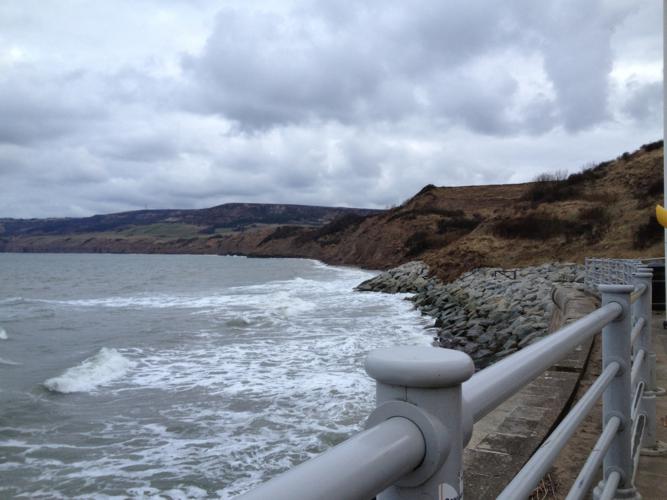 The coastline looking back from Robin Hood’s Bay
I didn’t actually do much reading despite having four days off with the bank holidays, but I’ve been making up for it since. Here’s the pile of what I am looking forward to in the rest of April:
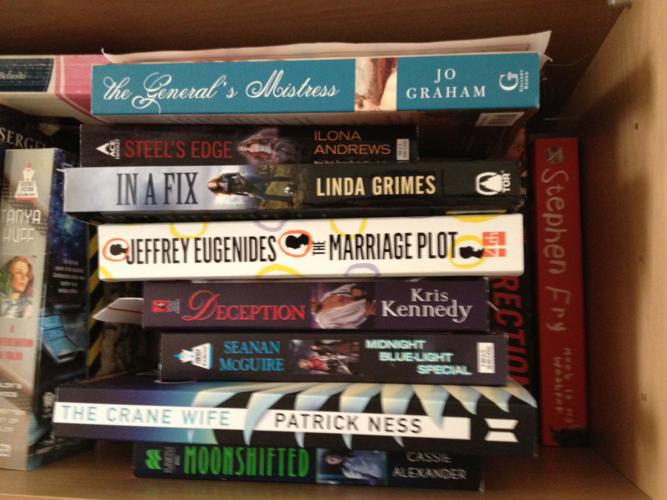
Apologies that the picture is a little bit blurry, but I think you can see that the urban fantasy focus is still strong. I’m up to date on a few of my favorite series, so I’m both trying new ones and continuing with some that weren’t necessarily my favorite on the first read, and there are lots of small ones that I can take on the train with me.
I’m also going to try and power through all the books I’ve acquired over the time I’ve been using Amazon Vine. In the US, they’ve tightened the rules so that everything you’ve received must be reviewed before you can request anything else, and I imagine the UK can’t be far behind. The program is useful for actually selecting books that I don’t get offered for review but am anxious to read as soon as I possibly can (see The Crane Wife above), so I’d prefer to stick with them while I can.
How’s your April going?
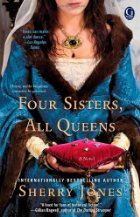 The count and countess of Provence had four daughters. A normal medieval family might have been disappointed that they didn’t have any sons, but not this one, because not only can these girls inherit, they can also be manuevered into place to become queens of countries across Europe. Marguerite is first, sent away to marry the French king, where she finds herself dominated by her mother-in-law and unable to exercise her own intellect. Then Eleanore is escorted to cold and rainy England to marry the “old” English king Henry III. Beatrice and Sanchia don’t gain their status as queen until well after marriage, but each have a husband chosen to benefit the family. Throughout their lives, the sisters work together and sometimes against one another, whether or not they choose to obey the family motto, “Family comes first”. The count and countess of Provence had four daughters. A normal medieval family might have been disappointed that they didn’t have any sons, but not this one, because not only can these girls inherit, they can also be manuevered into place to become queens of countries across Europe. Marguerite is first, sent away to marry the French king, where she finds herself dominated by her mother-in-law and unable to exercise her own intellect. Then Eleanore is escorted to cold and rainy England to marry the “old” English king Henry III. Beatrice and Sanchia don’t gain their status as queen until well after marriage, but each have a husband chosen to benefit the family. Throughout their lives, the sisters work together and sometimes against one another, whether or not they choose to obey the family motto, “Family comes first”.
For me, this book got off to an excellent start. I liked the relationship between the sisters as they were young, and the different ways that each sister adapts to her new life as a married woman. Because of the difference in ages, the marriages are staggered, so for a good portion of the first half of the book events are new and fresh. Each sister grows up and adapts to her marriage and husband differently, so that we get a great feel for each of their personalities and their struggles. It’s also nice to read something which focuses so clearly on the relationships between powerful siblings in a historical context and how ambition can put a huge wrench in the best of intentions.
Unfortunately, after the sisters were all married and settled, as often happens, the book started to lag. I can never really blame the author in these situations because, quite frankly, most women’s lives in this period, even those of queens, had the same cycle of pregnancy and birth which (for me at least) just doesn’t make for that exciting a story. In general, a queen gets pregnant, has a baby, and then hands the baby off to someone else. Occasionally one of them is separated from and then longs for her children, and Marguerite in particular has a dramatic time going off on Crusade for years and saving her incompetent husband, but I think the whole book lost a little bit and I struggled to get back to it. Plus, because there are four sisters, there are a number of scenes where the sisters get together and fight about various things, all of them being stubborn and none giving any ground. Beatrice is the main culprit here, as she spends most of the book longing for her sisters’ love and trying to win it and then coming up against a wall. It felt repetitive, even though there were still things going on in the wider plot.
I also think the book suffered because Eleanore and Marguerite were the more interesting queens – Sanchia and Beatrice married younger brothers who took crowns elsewhere and it is fairly clear that they hadn’t done much which was significant or left a huge historical record. The author’s hands are tied in these cases, of course.
Perhaps my expectations were too high, but Four Sisters, All Queens left me a bit cold after a promising start. Still a good prospect for someone who is looking for a book about powerful women and the relationships between them in medieval Europe.
I received this book for free for review.
|
|
 So! First up, I’ve been re-reading A Song of Ice and Fire by George R. R. Martin. I re-read A Game of Thrones and found myself completely swept up in it, despite the fact that I’ve read it twice and seen the show. I’m now in the middle of A Clash of Kings and I actually love this one, too. It’s so nice to get swept back up in a world that feels familiar, and I’ve been having a strange sort of fun picking out the differences between the show and the book. There are parts of the show that I’m convinced didn’t happen, so I’m looking forward to finding out whether this is true or not.
So! First up, I’ve been re-reading A Song of Ice and Fire by George R. R. Martin. I re-read A Game of Thrones and found myself completely swept up in it, despite the fact that I’ve read it twice and seen the show. I’m now in the middle of A Clash of Kings and I actually love this one, too. It’s so nice to get swept back up in a world that feels familiar, and I’ve been having a strange sort of fun picking out the differences between the show and the book. There are parts of the show that I’m convinced didn’t happen, so I’m looking forward to finding out whether this is true or not. The other book that I’ve been reading for what feels like a short eternity is The Sleepwalkers by Christopher Clark. It attempts to re-evaluate the causes of World War I, and since my husband has been interested in World War II and *its* origins, I’ve been trying this out for him as a background to the background, if that makes sense. I like history, he wants to make sure he’s reading something that will explain things to him properly, so it works out. Unfortunately this feels dense even for me, who loves history. I think it’s just because I don’t recognize any of the names or places in eastern Europe, so I quickly lose track of the significant Serbians simply because my brain doesn’t want to process their names. It’s annoying, and I’m actually very interested in the subject matter, so I’m persevering.
The other book that I’ve been reading for what feels like a short eternity is The Sleepwalkers by Christopher Clark. It attempts to re-evaluate the causes of World War I, and since my husband has been interested in World War II and *its* origins, I’ve been trying this out for him as a background to the background, if that makes sense. I like history, he wants to make sure he’s reading something that will explain things to him properly, so it works out. Unfortunately this feels dense even for me, who loves history. I think it’s just because I don’t recognize any of the names or places in eastern Europe, so I quickly lose track of the significant Serbians simply because my brain doesn’t want to process their names. It’s annoying, and I’m actually very interested in the subject matter, so I’m persevering.

 Well, I didn’t do very well with posting on my blog during this particular Read-a-thon, did I? I saw quite a few people posting on Tumblr and then linking their updates back to a main post, and I think I might just do that next time. I checked in on Twitter every so often and I’m looking forward to going around and seeing how everyone did a bit later on this afternoon.
Well, I didn’t do very well with posting on my blog during this particular Read-a-thon, did I? I saw quite a few people posting on Tumblr and then linking their updates back to a main post, and I think I might just do that next time. I checked in on Twitter every so often and I’m looking forward to going around and seeing how everyone did a bit later on this afternoon. My time zone in the UK makes the Read-a-thon’s hours a little bit awkward; it officially runs from 1 pm on Saturday to 1 pm on Sunday. There is simply no way that I can stay up all night and then until 1 pm, much less go to work on Monday, so I’ve never actually tried, but I like that I still get to spend Sunday morning reading away and generally getting one last book in before the event is over. It’s even easier now that my schedule seems to ensure I’m up around 7 or 7:30 on the weekend, so I had hours to read Midnight Blue-Light Special by Seanan McGuire and try to make some progress in The Sleepwalkers by Christopher Clark.
My time zone in the UK makes the Read-a-thon’s hours a little bit awkward; it officially runs from 1 pm on Saturday to 1 pm on Sunday. There is simply no way that I can stay up all night and then until 1 pm, much less go to work on Monday, so I’ve never actually tried, but I like that I still get to spend Sunday morning reading away and generally getting one last book in before the event is over. It’s even easier now that my schedule seems to ensure I’m up around 7 or 7:30 on the weekend, so I had hours to read Midnight Blue-Light Special by Seanan McGuire and try to make some progress in The Sleepwalkers by Christopher Clark. 6. What were the names of the books you read?
6. What were the names of the books you read?
 George is living out the fairly boring life of a middle-aged divorced “good guy” until one night he hears a strange noise outside his house. He finds a crane, her wing pierced by an arrow; he saves her and she flies away. The next day, a beautiful, somehow old fashioned woman called Kumiko appears outside his print shop, and he falls in love with her almost immediately. George’s adult daughter, Amanda, is mystified and somewhat jealous, living out her own life as a single mother with a small child and feeling as though she’s never quite fit in. In small, significant ways, Kumiko starts to change their lives, but never quite lets them into her own.
George is living out the fairly boring life of a middle-aged divorced “good guy” until one night he hears a strange noise outside his house. He finds a crane, her wing pierced by an arrow; he saves her and she flies away. The next day, a beautiful, somehow old fashioned woman called Kumiko appears outside his print shop, and he falls in love with her almost immediately. George’s adult daughter, Amanda, is mystified and somewhat jealous, living out her own life as a single mother with a small child and feeling as though she’s never quite fit in. In small, significant ways, Kumiko starts to change their lives, but never quite lets them into her own. Princess Harueme has lived her life in the shadow of Japanese emperors. In the winter of her years, though, she needs to leave court and head to a convent, where she already knows she will die. Compelled to fill empty notebooks, Harueme begins telling the story of Kagaya-hime, a cat who has lost her family and her fudoki due to a horrible fire in the middle of her city. As the story progresses, Harueme intertwines the tale of her own life with Kagaya-hime’s, and we slowly learn about these two women and their individual struggles.
Princess Harueme has lived her life in the shadow of Japanese emperors. In the winter of her years, though, she needs to leave court and head to a convent, where she already knows she will die. Compelled to fill empty notebooks, Harueme begins telling the story of Kagaya-hime, a cat who has lost her family and her fudoki due to a horrible fire in the middle of her city. As the story progresses, Harueme intertwines the tale of her own life with Kagaya-hime’s, and we slowly learn about these two women and their individual struggles. Seraphina has spent much of her life refusing friendships and hiding herself from those who might get close to her. Why? Because she is half dragon, would be considered an abomination by almost everyone she knows, and cherishes her relative freedom from prejudice and prosecution. The love between her parents was forbidden and she has already overstepped her bounds slightly by taking a job in the royal court, helping with the orchestra and giving the Princess Grisselda music lessons. The peace between dragons and humans is an uneasy one, however, particularly when dragons can take human form, indistinguishable from real humans if they fail to wear their bells. Both dragons and humans are wary, and it would take just one powerful rebel to tip the balance.
Seraphina has spent much of her life refusing friendships and hiding herself from those who might get close to her. Why? Because she is half dragon, would be considered an abomination by almost everyone she knows, and cherishes her relative freedom from prejudice and prosecution. The love between her parents was forbidden and she has already overstepped her bounds slightly by taking a job in the royal court, helping with the orchestra and giving the Princess Grisselda music lessons. The peace between dragons and humans is an uneasy one, however, particularly when dragons can take human form, indistinguishable from real humans if they fail to wear their bells. Both dragons and humans are wary, and it would take just one powerful rebel to tip the balance. Mary Mallon is an Irish immigrant simply doing her best to get by in a difficult world. At the turn of the twentieth century, few jobs are open to older women, but Mary has found her calling as a cook. By the time she hits her fifth decade, Mary has cooked for some of Manhattan’s most prominent families. But sickness follows her everywhere she goes, though she barely realizes it; after cooking for a few weeks, the family is inevitably hit by an illness that kills one or more of them. Mary never puts together the pieces, but others do, and soon she’s accused of spreading typhoid around New York and killing two dozen people.
Mary Mallon is an Irish immigrant simply doing her best to get by in a difficult world. At the turn of the twentieth century, few jobs are open to older women, but Mary has found her calling as a cook. By the time she hits her fifth decade, Mary has cooked for some of Manhattan’s most prominent families. But sickness follows her everywhere she goes, though she barely realizes it; after cooking for a few weeks, the family is inevitably hit by an illness that kills one or more of them. Mary never puts together the pieces, but others do, and soon she’s accused of spreading typhoid around New York and killing two dozen people. Catherine the Great is an iconic female monarch, known even to those who have never glanced at Russian history. Her reign ushered in something of a golden age for much of Russia, symbolized by cultural and physical expansion, the effects of which were felt for decades after her reign had concluded. In this biography of Catherine, Robert K. Massie covers the entirety of her life, from her origins as a relatively modest German daughter of a prince, through her disastrous marriage to the heir to the Russian throne, until her death as one of Russia’s greatest rulers.
Catherine the Great is an iconic female monarch, known even to those who have never glanced at Russian history. Her reign ushered in something of a golden age for much of Russia, symbolized by cultural and physical expansion, the effects of which were felt for decades after her reign had concluded. In this biography of Catherine, Robert K. Massie covers the entirety of her life, from her origins as a relatively modest German daughter of a prince, through her disastrous marriage to the heir to the Russian throne, until her death as one of Russia’s greatest rulers.



 The count and countess of Provence had four daughters. A normal medieval family might have been disappointed that they didn’t have any sons, but not this one, because not only can these girls inherit, they can also be manuevered into place to become queens of countries across Europe. Marguerite is first, sent away to marry the French king, where she finds herself dominated by her mother-in-law and unable to exercise her own intellect. Then Eleanore is escorted to cold and rainy England to marry the “old” English king Henry III. Beatrice and Sanchia don’t gain their status as queen until well after marriage, but each have a husband chosen to benefit the family. Throughout their lives, the sisters work together and sometimes against one another, whether or not they choose to obey the family motto, “Family comes first”.
The count and countess of Provence had four daughters. A normal medieval family might have been disappointed that they didn’t have any sons, but not this one, because not only can these girls inherit, they can also be manuevered into place to become queens of countries across Europe. Marguerite is first, sent away to marry the French king, where she finds herself dominated by her mother-in-law and unable to exercise her own intellect. Then Eleanore is escorted to cold and rainy England to marry the “old” English king Henry III. Beatrice and Sanchia don’t gain their status as queen until well after marriage, but each have a husband chosen to benefit the family. Throughout their lives, the sisters work together and sometimes against one another, whether or not they choose to obey the family motto, “Family comes first”.






Recent Comments